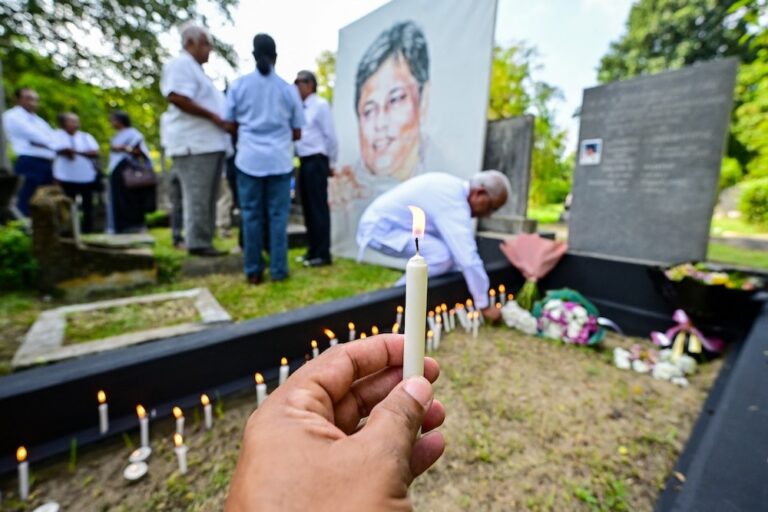(FMM/IFEX) – According to “Prajathanthra” (the Foundation for Freedom of Expression – Sri Lanka), Niresh Eliathamby, a journalist attached to the Associated Press bureau in Colombo, was held at gunpoint for more than two hours by security services personnel while he was carrying out his duties as a journalist on 15 October 1997, the day […]
(FMM/IFEX) – According to “Prajathanthra” (the Foundation for
Freedom of Expression – Sri Lanka), Niresh Eliathamby, a
journalist attached to the Associated Press bureau in Colombo,
was held at gunpoint for more than two hours by security services
personnel while he was carrying out his duties as a journalist on
15 October 1997, the day of a major bomb explosion in Colombo.
Eliathamby was walking in the Colombo Fort area, about nine hours
after the bomb blast. He was taking some rolls of film to his
office. He was questioned and taken in by two members of the Sri
Lanka Navy, who said he had no right to have film with him or
take photographs in that area without the written permission of
the Secretary of Defence. The position that a journalist should
get special permission from the Secretary of Defence to
photograph the site of a bomb explosion and a confrontation, was
a position never before taken by the government, the police or
the security forces
Eliathamby was taken in a van from Colombo to the Sri Lanka Navy
base at Rangalla, several miles away, where he was held at
gunpoint and ordered to remove his shirt. He was denied a request
for a drink of water. Those who interrogated him refused to
accept his Accreditation Card as a Journalist of Associated Press
issued by the Government’s Director of Information. They also
refused to take notice of the National Identity Card he carried.
He was also refused permission to make a telephone call to his
office to verify his identity. The naval personnel who
questioned, threatened and treated him roughly, did not take any
notice of his requests that they verify his identity and
occupation by contacting the Director of Information, the media
spokesman of the military, and his colleagues at Associated
Press.
He was on the point of being blindfolded when he was able to
attract the attention of an officer who was passing by. This
officer called in a senior officer who took the necessary steps
of verifying his identity and having him released.
While many journalists took photographs of the scene of the
explosion and the surroundings that day, there were no
restrictions placed on them. The fact that Eliathamby was taken
in, questioned and harassed in this manner, much later, when he
was alone, appears to be because he belongs to the Tamil
community.
The South Asia Bureau Chief of Associated Press, Arthur Max,
stationed in New Delhi, has lodged a strong protest with the
Government about this mistreatment of Eliathamby, who has been
working at AP for several years and is a well-known journalist in
Sri Lanka.
Recommended Action
Send appeals to authorities:
disciplined and that such actions will not take place in future.
Appeals To
Mr. Mangala Samaraweera,
Minister for Media
Fax: 94 1 594536Gen. Anuruddha Ratwatte
Deputy Minister for Defence
Fax: 94 1 430590Mr. Chandrananda de Silva
Secretary Defence
Fax: 94 1 541529Com. Cecil Tissera,
Commander of the Navy
Fax: 94 1 433896Mr. Ariya Rubesinghe,
Director of Information
Fax: 94 1 576956
Please copy appeals to the source if possible.


